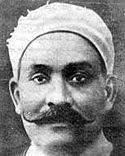Mustafa Lutfi al-Manfaluti
From Wikipedia, the free encyclopedia

Mustafa Lutfi el-Manfaluti.
Mustafa Lutfi el-Manfaluti (1876–1924) was an Egyptian writer and poet who was born in the Upper Egyptian city of Manfalut to an Egyptian father and a Turkish mother.[1]
He memorized the Quran before the age of twelve. He studied at Al-Azhar University in Cairo. He translated and novelised plays from French, and wrote (and translated) several short stories. His most famous work is a collection of his articles under the title: el-Nazarat (Arabic: النظرات).
One of his most notable traits is that he couldn't read or speak French. He asked some of his friends to translate the play or the book to Arabic, then he rewrote them.
Some of his books are:
- Majdolin (Arabic: ماجدولين)
- Al-Abarat (The Tears) (Arabic: العبرات),
- Ash-Sha'er (The Poet) (Arabic: الشاعر),
- Fee Sabeel Et-taj (For the Sake of the Crown) (Arabic: في سبيل التّاج),
- Al-Fadeela (Virtue) (Arabic: الفضيلة).
See also
References
|
This article is issued from Wikipedia. The text is available under the Creative Commons Attribution/Share Alike; additional terms may apply for the media files.